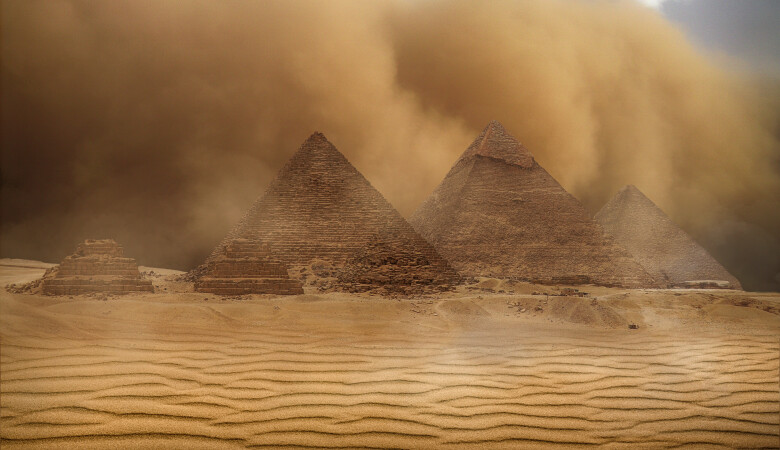The Consummation of the Ages: Eternity of Joy in a Redeemed World (Isaiah Sermon 66 of 80)
March 08, 2015 | Andy Davis
Isaiah 55:10-13
The Doctrine of Scripture
Pastor Andy Davis preaches a verse-by-verse expository sermon on Isaiah 55:10-13. The main subject of the sermon is the sufficiency of and joy found in God's word.
- SERMON TRANSCRIPT-
Well, before I get going, let me just tell you where we're heading in terms of the preaching ministry of the church. This is my last sermon in Isaiah for a while. I hope if God opens the door, if God makes you willing to return because there's still good things in Isaiah 56 through 66, and God may well lead us back. And I would like that, I would love that, but this is it for Isaiah for now, for the foreseeable future. Next week, we're going to begin a four-week series in 1 Corinthians 15, focused on the resurrection leading right up to Easter of course, and I'll preach two of those four sermons culminating Easter Sunday in a look at 1 Corinthians 15. It's going to be a marvelous time. And then I will be God willing, going to Ephesians and starting in that book. So I'm looking forward very much to that. So that's where we're heading. So again, and not in any way saying there's not more wonderful things in Isaiah, there is, but I'm just eager to get on to some other things as well. So.
Just by way of introduction, this morning, let's just get some context of where we've been in Isaiah, Isaiah 53-55, is just an incredible, beautiful section of Scripture. There's so much in there. And we saw in Isaiah 53, probably the most significant and clearest predictive prophecy of Christ there is in the Old Testament. Very, very powerful and clear and how we saw in Isaiah 53, without a doubt how the Lord through Isaiah, seven centuries before Jesus was born, clearly predicted the substitutionary atonement of Jesus Christ. How he died in our place as a sacrifice for sins and how he by his work on the cross justifies all who believe in him. And that is so plainly seen in Isaiah 53. So plainly seen in words like this, Isaiah 53:5-6, "He was pierced for our transgressions, he was crushed for our iniquities, the punishment that brought us peace was upon him, and by his wounds, we are healed. We all like sheep have gone astray, each of us has turned to his own way and the Lord has laid on him the iniquity of us all." This is the Gospel message, this is the center piece of the Gospel. Christ the Son of God died in our place and was buried in a rich man's tomb and was raised to new life and will spend eternity looking on his spiritual descendants and rejoicing in them. Isaiah 53.
And then we saw in Isaiah 54, so beautifully how this Gospel message, this work of the suffering servant, of Christ on the cross, is going to go worldwide it's going to go to the ends of the earth, the Gospel is going to spread out to the ends of the Earth, and as a result, Zion, the city of God, the people of God, the tent of God, so to speak, is going to have to get really, really big. It's going to get really big. And so we saw in Isaiah 54:2-3, God speaking to Zion, "Enlarge the place of your tent, stretch your tent curtains wide, do not hold back, lengthen your cords, strengthen your stakes, for you will spread out to the right and to the left and your descendants will dis-possess nations and settle in their desolate cities." Isaiah 54. Missions. It's going to get really, really big. So then in Isaiah 55, we come to this incredible chapter. This is our third week in Isaiah 55. And here we have the invitation of Almighty God to the banquet, the banqueting table of salvation in Christ. So, two weeks ago in verses 1-5 of Isaiah 55, we spoke of this incredible banquet this feast of salvation to which Almighty God is calling us sinners. And we saw the liquids that were served there, water and milk and wine. Water, the symbol of eternal life. How if we don't get it we'll die. And where we're parched and then we drink this water, this living water, which is Christ and we will live forever.
And then milk the picture of spiritual nourishment how we get all the nutrients that we need, at this banqueting table. Everything that we'll need for life and godliness I given us through this banqueting table, through Christ. And then wine in the Bible a symbol of just joyful celebration. The desire we all have to just cut loose and be free in joy. And how through the ministry of the Spirit not getting drunk with wine, which leads to debauchery, but instead, filled with the Spirit, we sing and worship, and rejoice. And that's what God is calling us sinners to do. We are invited to this feast, we who are thirsty. Look at verse 1-3. "Come all you who are thirsty, come to the waters, and you who have no money, come buy and eat. Come buy wine and milk without money and without cost. Why spend money on what is not bread and your labor on what does not satisfy? Listen, listen to me and eat what is good and your soul will delight in the richest of fair. Give ear and come to me, hear me that your soul may live."
So God is calling on sinners who have nothing to offer, who have no money with which they can buy anything or who have resources but who are wasting, squandering their resources on what does not satisfy. Who are living for things that do not, that will never satisfy. He calls on sinners to this banqueting table. And last week in verses 6-9, we saw the way by which we respond to this incredible invitation. And how these verses 6-9 call on us to respond with urgency to this invitation, to respond with brokenness and repentance over our sins. Look at verses 6 and 7, "Seek the Lord while he may be found, call on him while he is near. Let the wicked forsake his way and the evil man, his thoughts, let him turn to the Lord and he will have mercy on him and to our God for he will abundantly, freely pardon." And so the time is now we saw that last week. Today is the day of salvation. There's a window of opportunity, there's a door opened on the Ark, but it's going to close sometime.
And when God decides it's over, it's over, but today is the day of salvation. And so, we should seek the Lord while he may be found, while there's still an opportunity, there's an urgency to this. And we should forsake our evil ways and our wicked thoughts and we should turn to God in repentance, and brokenness and find salvation in Christ. And if we do this, he will freely, completely, richly pardon us for all our sins. The very King that we have spent years rebelling against, violating his laws, transgressing his commands, this very King is willing to forgive us and to sit at banquet table with us in Christ. And why should we repent, why should we turn away from our wicked ways and our evil thoughts? Because God the King is different from us, he says, "For my thoughts are not your thoughts, neither are my ways your ways declares the Lord. As the heavens are higher than the Earth, so are my ways higher than your ways and my thoughts than your thoughts." So how is he different? Well we saw last week in two ways. First of all, he's just different in holiness. The call has gone to the wicked to turn away from his wicked ways and his evil thoughts. And so he says, "For my ways are not your ways, and my thoughts not your thoughts." So, he's different from us in that we're wicked and evil and he's not.
He's infinitely pure and holy, as the heavens are higher than the earth. So much higher is he than us in holiness and purity. He is perfect light and in him there is no darkness at all. So we should repent because he's so different from us. That's the first logical connection in holiness. But looking a little more deeply, more immediately. If you look at the link between verse 7 and 8, we saw this last time, he says, "Let him turn to the Lord…for he will freely pardon. For my ways are not your ways and my thoughts are not your thoughts…" So the immediate link there is mercy and forgiveness. God is inviting us to come to him in repentance and brokenness over sin, because he forgives in ways we can scarcely imagine. He is just so lavish in his forgiveness. He's so good at it. He's so really, really good at forgiveness, he loves to forgive. A picture of that, as we've said, Luke 15, and Daniel alluded, the father of the prodigal son, what a beautiful, beautiful picture of God that is.
Remember how Jesus said, "But while he was still a long way off, his father saw him and was filled with compassion for him; he ran to his son, threw his arms around him and kissed him. The son said to him, 'Father, I have sinned against heaven and against you. I am no longer worthy to be called your son.' But the father said to his servants, 'Quick! Bring the best robe and put it on him. Put a ring on his finger and sandals on his feet. Bring the fattened calf and kill it. Let's have a feast and celebrate. For this son of mine was dead and is alive again; he was lost and is found.' So they began to celebrate." That is just how good God is at forgiveness, how lavishly willing he is to forgive and to have a feast with us when we genuinely repent of our wicked ways. I think these two themes are so vital. We can't choose the one or the other. We should repent because God's perfectly holy and his ways are not our ways. And we should be pure, and we're not, and so we need to repent because God is, God is light, and in him, there's no darkness at all.
I've often said, I think there are two images of God we must keep together all the time in our minds. And the first comes from Hebrews 12. "Our God is a consuming fire." And the second image is the father of the prodigal son running down the driveway and embracing his repentant son with tears. And people tend to emphasize the one or the other. We just can't. You just have to have both up in your mind all the time. God is holy and pure and hates sin. And God is merciful and loving and loves sinners and welcomes them. And you gotta have both. And so that's what I think the link between verse 6 and 7, and then verse 8, and 9 gives us the picture of both and not one or the other.
I. God’s Purpose for His Word: Be Effective as the Rain (vs. 10-11)
Now, Isaiah 55, picks right up where we left off, this lofty God who sits enthroned above the circle of the Earth, whose ways are not our ways and whose thoughts are not our thoughts, who yearns to call us in from the cold of sin to a warm, rich, well, lavishly appointed banquet, is sending forth this powerful force to bring about what he wants, which is a full banqueting hall. He wants his tables filled with people. And so he's sending forth a sovereign power to make it happen and that is His Word. His effective sovereign Word, he sends it out into the world to make certain that his eternal banqueting hall is filled with people.
Look at verses 10-13, "As the rain and the snow come down from heaven, so is my Word that goes out from my mouth. It will not return to me empty, but will accomplish what I desire and achieve the purpose for which I sent it." That's what he's saying, he's sending forth His Word. And he has a purpose in all of this, and we're going to look at God's purpose, we're going to look at God's purpose for His Word and how he wants it to be as effective as the rain verses 10 through 11. God's purpose for us is to rescue us and give us joy and peace in Verse 12. God's purpose for creation is triumphant deliverance from the curse, verses 12-13. And God's ultimate purpose for himself is everlasting glory in all of this, verse 13.
So let's begin with God's purpose for his Word. And so, we're looking this morning at God's irresistible force, his words, sent forth from Heaven to compel the elect to come to the feast of salvation in Christ. Verses 10-11, "As the rain and the snow come down from heaven and do not return to it without watering the earth, making it bud and flourish so that it yields seed for the sower and bread for the eater, so is my Word that comes out from my mouth. It will not return to me empty, but will accomplish what I desire and achieve the purpose for which I sent it." So God rolls out the power here. The irresistible force by which this feast is going to be well populated. Now, the attendees to the feast are locked up in Satan's dark dungeon, they're locked up in chains there. Verse 7 makes this plain, "Let the wicked forsake his way and the evil man his thoughts." So Satan holds his prisoners in check, holds them in prisons of wickedness and sin and they need to be rescued, they need to be delivered from the wickedness of their hearts. Colossians 1:13 says, "He has rescued us from the dominion of darkness and brought us over into the kingdom of his beloved son."
Later in that same chapter, Colossians 1 he says, "Once you were alienated from God and were enemies in your minds because of your evil behavior." Think about those words. Minds. Behavior. So reverse it, behavior, mind. "Let the wicked forsake his way", that's behavior. "And the evil man his thoughts," that's his thinking patterns. It's the same thing in Colossians 1. "You were alienated from God and were enemies in your minds as displayed by your wicked behavior." That's what he's saying. And so, we're locked up, we're in chains, we can't get out, we can't set ourselves free. So how do such people get delivered, how do they get rescued from their own wicked ways, and their evil thoughts? Only by God's sovereign Word, it's the only thing that will do it. Verse 11. "So is my Word that goes out from my mouth." So God focuses on his Word. The same power by which He created the physical universe.
It says in Psalm 33:6, "By the Word of the Lord were the heavens made. Their starry host by the breath of his mouth." So that's how God made the universe, you know in Genesis 1:3. "God said, Let there be light and there was light." And throughout Genesis 1, God said let this happen, and it happened, let that happen. By the Word of God, we have creation.
God Likens His Word to Rain and Snow
So God then likens his Word to rain and snow. Verse 10, "As the rain and the snow come down from heaven, so is my Word that goes forth from my mouth." So he's trying to help us to understand how his Word acts in the world. The heavenly origin, it starts from God, it starts in his mind and it goes forth from his mouth. So you got this movement from heaven down to earth, that's the movement here. So God's Word starts in his mind goes out of his mouth and comes down heaven to earth like the rain. So if God doesn't initiate salvation, not one of us will ever be saved, it all starts with God. All life depends on rain for its continued existence. God gives the rain that sustains both plant and animal life. Rain is an amazing gift from God. It really is.
Job 5:8-10, Job said this. "As for me I would seek God, and I would place my because before God who does great and unsearchable things. Wonders without number. He gives rain on the Earth and sends water on the fields." Well, think about that. Job 5 calls rain a great and unsearchable thing that God does. Some time ago I read a meditation on this by John Piper which I thought was amazing, helpful. He said this.
Is rain a great and unsearchable wonder wrought by God? Picture yourself as a farmer in the Near East, far from any lake or stream. A few wells keep the family and animals supplied with water. But if the crops are to grow and the family is to be fed from month to month, water has to come on the fields from another source. From where?
Well, the sky. The sky? Water will come out of the clear blue sky? Well, not exactly. Water will have to be carried in the sky from the Mediterranean Sea, over several hundred miles and then be poured out from the sky onto the fields. Carried? How much does it weigh? Well, if one inch of rain falls on one square mile of farmland during the night, that would be 27,878,400 cubic feet of water, which is 206,300,160 gallons, which is 1,650,501,280 pounds of water.
That's heavy. So how does it get up in the sky and stay up there if it's so heavy? Well, it gets up there by evaporation. Really? That's a nice word. What's it mean? It means that the water sort of stops being water for a while so it can go up and not down. I see. Then how does it get down? Well, condensation happens. What's that? The water starts becoming water again by gathering around little dust particles between .00001 and .0001 centimeters wide. That's small.
What about the salt? Salt? Yes, the Mediterranean Sea is salt water. That would kill the crops. What about the salt? Well, the salt has to be taken out. Oh. So the sky picks up a billion pounds of water from the sea and takes out the salt and then carries it for three hundred miles and then dumps it on the farm?
Well it doesn't dump it. If it dumped a billion pounds of water on the farm, the wheat would be crushed. So the sky dribbles the billion pounds water down in little drops. And they have to be big enough to fall for one mile or so without evaporating, and small enough to keep from crushing the wheat stalks.
How do all these microscopic specks of water that weigh a billion pounds get heavy enough to fall (if that's the way to ask the question)? Well, it's called coalescence. What's that? It means the specks of water start bumping into each other and join up and get bigger. And when they are big enough, they fall. Just like that? Well, not exactly, because they would just bounce off each other instead of joining up, if there were no electric field present. What? Never mind. Take my word for it.
I think, instead, I will just take Job's word for it. I still don't see why drops ever get to the ground, because if they start falling as soon as they are heavier than air, they would be too small not to evaporate on the way down, but if they wait to come down, what holds them up till they are big enough not to evaporate? Yes, I am sure there is a name for that too. But I am satisfied now that, by any name, this is a great and unsearchable thing that God has done. – John Piper
God's gift of rain is a gift of life. It's a clear display of his power and his goodness. Job 36:27 and following says, "He draws up the drops of water which distill as rain down to the streams. The clouds pour down their moisture and abundant showers fall on mankind. Who can understand how he spreads out the clouds, how he thunders from his pavilion. See how he scatters his lightning about him bathing the depths of the sea. This is the way he governs the nations and provides food in abundance." Matthew 5:45, Jesus said, "He causes his sun to rise on the evil and the good and sends rain on the righteous and the unrighteous." I just would submit to you as a Christian whenever it precipitates, you should set aside time and thank God for it. Thank God for it.
Non-Christians aren't going to do it. "Although they knew God, they neither glorified him as God nor gave thanks to him." It's your job when it rains to thank him for it, because he is sustaining your life. But rain makes a round trip doesn't it? As we've seen, a round trip. The verse highlights the circularity, a round-trip of rain, it comes down in showers, goes back up in evaporation, it's a big circle. But before it goes back up, he says it accomplishes the reason why God sent it.
God’s Word Accomplishes His Purposes
So is God's Word coming from his mouth. It goes out and then comes back having achieved the purpose. So God's purpose in rain and snow, he says, "As the rain and the snow come down from heaven, and do not return to it without watering the earth making it bud, and flourish, so, it yields seed for the sower and bread for the eater." So God sends rain for a good purpose, it enriches the Earth, it waters the Earth, it makes it, it says bud and flourish. So, the plants soak in this rainwater and they produce buds.
And if you thought the whole rain thing was complicated, how the water produces buds in plants is vastly more complicated, but God does this. Now, the buds eventually become beautiful fragrant flowers or succulent fruit or growing vegetation and within the fruit, then you have seed for the sower, it says, so that the whole thing can continue going on. This is a whole system of agriculture that God has figured out to keep us alive. Everything's ready, the genetic code of the flowers and the fruits and the grains are ready, the root systems in place, all that's needed is rain. Rain. And God sends it. So life, the rest of life, animal life, depends on the plants staying alive and the plants depend on rain and the rain comes when God sends it. That's what this text is saying. Well, now, let's look at the analogy with the Word. "So is my Word that goes out from my mouth, it will not return to me empty, but will accomplish what I desire and achieve the purpose for which I sent it." So the Word has a round trip too. It goes out from his mouth, through the ministry of the Holy Spirit to the apostles and prophets who wrote it down. Long time ago.
And then by the Spirit, he moves evangelists and missionaries, and pastors, and teachers, to deliver the Word to His people, so that they hear it. He's sending out his Word in this way. And then it goes back to God in praise and honor and glory where he gets credit for what he's done and worshiped, ultimately worshiped, that's the harvest. And so Romans 1:36, has this whole thing summarized. "For from him and through him", and I like to say back to him, "are all things." You see the circularity of it. From him, through him, they're sustained and then back to him they go, are all things. To him be the glory forever. And he says, 100% of the time, the Word achieves the reason, the purpose for which he sent it. Now, here's where it gets pretty troublesome. Here's where it gets difficult. He says it doesn't return to God empty, it doesn't return, some translations say void, a failure. You can't imagine the Word of God personified coming back and saying to the Father, "I'm sorry I couldn't do what you sent me to do, I tried, but it just didn't work."
You know who the Word of God personified is, don't you, it's Jesus. Can you imagine Jesus, the Word, coming back to heaven saying, I couldn't do what you sent me to do. I can't imagine that. So God's sovereign Word trumps every card in the human deck, it trumps all of man's will and man's power and man's purpose and man's plans. As Isaiah 14:26-27 said, "This is the plan determined for the whole world, this is the hand stretched out over all nations. For the Lord Almighty has purposed and who can thwart him. His hand is stretched out and who can turn it back." Same is true of the Word, God's Word wins, every time it wins. Always. Well, in order to make sense of this as we see actually what happens when the Word is preached, when the Gospel is preached, when sermons are preached, when we see actually what happens, we might be troubled by the statement of 100% achievement. So we have to look a little deeper to see what God's purposes might be.
And I think God has both a purpose for the elect, and a purpose for the non-elect. And this is meat and not everyone has teeth to chew it, but it's just how the Bible reveals it. We have to understand. God's purpose for the elect is salvation, eternal salvation, and his Word always achieves it, it never fails to bring in one of those that God chose from before the foundation of the world. They 100% get saved and no one gets lost. And so when God sends forth the Gospel in his good time, in his purpose, in his ways at the right time, in the fullness of time, for that individual, they repent and believe. And he doesn't lose any of them. But he also has a purpose for the non-elect, what the Scripture calls a reprobate. And his purpose for them is to harden them. And so the Word goes out, and actually has a hardening effect on some people. They hear the Gospel and their hearts are harder toward God and they're more angry at God and more hostile toward God and they've been hardened by it.
This is the absolute sovereignty of God. It's central. Without it we'll not make sense of this 100% success rate for the Word. Hundred percent of the elect will repent and come to Christ. John 6:37, "All that the Father gives me will come to me." And 100% of the non-elect will be hardened into judgment. As it says in Romans 9:18, "Therefore God has mercy on whom he wills to have mercy, and he hardens whom he wills to harden." This happens every time the Gospel of Jesus Christ is preached. Some hear and repent and come to salvation through faith in Christ. Others hear the exact same message, and their hearts are hardened and they're more hostile and they refuse to come. The Apostle Paul talked about this in 2 Corinthians 2:15-16, he's talking about his ministry in evangelism and missions. He says, "We", we the evangelists, we the missionaries, "We are to God the aroma of Christ among those who are being saved and those who are perishing. To the one we are the smell of death and to the other we are the fragrance of life." Exact same message, sometimes the fragrance of life and sometimes the stench of death. So God's Word accomplishes everything he sends it to do. It will not return to him empty.
So, sometime you may go out as an evangelist and share faithfully the Gospel and use good illustrations and answer whatever questions come up and the person refuses to believe. And if in the end you find out... Now we don't know, they might be elect and coming to faith in Christ a year from now, two years from now. We're always full of good hope, always. But if in the end, it turns out they were goats, they were weeds and not wheat etcetera, you didn't waste your time there, you were sent by God to go share a message that had a hardening effect and that was what God intended.
II. God’s Purpose for Us: Rescue, Joy, and Peace (vs. 12)
Now we are always yearning, aren't we, always and should be yearning for salvation. We go out with joy, and led forth with peace to see people saved and that's what we yearn for. So we see in verse 12, God's purpose for us, the elect, his children, and that is rescue, joy and peace. "You'll go out in joy and be led forth in peace, the mountains and the hills will burst into song before you, and all the trees of the field will clap their hands. And instead of the thorn bush will grow the pine tree, and instead of briers, the myrtle will grow."
So for the believers, God's purpose is astonishingly sweet. First, he speaks of rescue. You will go out, he says. You'll be led forth. This is Exodus language, do you hear it? They're going out from their slavery. We could see it in terms of the post-exile, go out from bondage and Babylon. You're going to go out from slavery. You're going to go out from sin, you're going to be led forth. You're going to go out from Babylon, and go back to the Promised Land. You're going to go out, earlier, go out from slavery in Egypt, you're going to go live in a beautiful land flowing with milk and honey. You're going to go out from sin from Satan's kingdom. I'm going to break the chains of wickedness and sin and death. I'm going to set you free. I'm going to set you free from death. I'm going to speak your name when you're in the grave and you're going to come out with joy into resurrection. You're going to go out of the grave into a resurrection body and into a resurrected world and you're going to see the beauty and rejoice. You're going to go out with joy and be led forth in peace. And we see the joy, the Gospel comes, you're going to go out with joy, you're going to be filled with elation through the Holy Spirit, your hearts are going to be filled with joy. Foretaste now through the ministry of the Word through the Holy Spirit we get a down payment of joy, the fruit of the Spirit is joy.
But then on that resurrection day, what kind of joy will you have when you're free from death, mourning, crying, and pain, for ever. And you're going to be led forth with peace. Peace is a right relationship with God. Having been justified through faith, we have peace with God through our Lord Jesus Christ. And a feeling, a sense of peacefulness in the hear. Again, the gift of the fruit of the Holy Spirit. The peace of God, which transcends all understanding, guarding your heart and your mind in Christ Jesus. Yes, but how great will be your peace in Heaven? Can we even imagine what that peacefulness will feel like in heaven, when there are no more enemies, when all of it is done and we are free forever. No more enemies to torment us and to torture us. Sin and Satan, the world and the flesh, the devil, done. And then death, it says in 1 Corinthians 15, the final enemy, we'll talk about that in due time, in the next few weeks. 1 Corinthians 15, death has been destroyed, death has died and we're free from it, and great will be our joy and our peace and we'll celebrate.
III. God’s Purpose for Creation: Triumphant Deliverance from the Curse (vs. 12-13)
We see in verse 12 and 13 also, God's purpose for creation. And this is triumphant deliverance from the curse. Look what it says, "You will go out in joy and be led forth in peace; the mountains and hills will burst into song before you, and all the trees of the field will clap their hands. Instead of the thornbush will grow the pine tree, and instead of briers the myrtle will grow." Friend, salvation is primarily in the Bible focused on what it does for human beings. It's the center piece of his saving work, but it's not all that he's doing, it's not all the saving work of God. What do I mean by that? Well, you know that in Adam, when Adam sinned, as a result of Adam's sin, God cursed the earth. There's a link between Adam and the ground from which he was taken. So God cursed the earth, because of Adam's sin. Remember in Genesis 3:17-19 to Adam he said, "Because you listened to your wife and ate from the tree about which I commanded you, 'you must not eat of it', cursed is the ground because of you. Do you hear those words? "Cursed is the ground because of you, through painful toil you'll eat of it all the days of your life." Listen, "it will produce thorns and thistles for you."
Now, the thorns and thistles represent God's curse on the Earth. It represents crop failure, you see that? I mean you didn't intend thorns and thistles and that's what you got. All your labor produced vanity and emptiness, you didn't get what you thought you would get. It's disappointment, crop failure. So whatever reason, locusts, an early frost, and hail storms, and drought and blights and mildew and all of that. Hurricanes destroys the crops. But the agony goes beyond just thorns and thistles. That's just a symbol of all the convulsions of the earth that have been going on since Adam's sin. I'm talking about earthquakes and tsunamis and hurricanes and mud slides and tornadoes and all of those natural disasters that just take tens of thousands of human lives. Therefore, in Christ, the curse is removed, and that's symbolized by the fact that when Jesus died, he had a crown of thorns woven together by the Roman soldiers in mockery. But I think in direct symbolic fulfillment of how in Christ, or literally through the blood of Christ, the curse is removed. So here, these thorns are put on his scalp, and then they took a rod and smashed it into his head into his scalp, and they just cut in and just blood starts streaming down his face and that blood removes the curse, it removes the thorns and thistles from the earth.
And so we have very plainly said for us in Romans 8, the extent of this saving work on ecology, on nature, on the Earth. It says in Romans 8:19-23, "The creation waits in eager expectation for the sons of God be revealed. For the creation was subjected to futility. Not by its own choice, but by the will of him who subjected it in hope that the creation itself will be liberated from its bondage to decay and brought into the glorious freedom of the children of God. Now, we know that the whole creation has been groaning as in the pains of childbirth right up to the present time, Not only so, but we ourselves who have the first fruits of the Spirit, we groan inwardly as we wait eagerly for our adoption as sons, the redemption of our bodies." Do you hear that? The physical earth, the creation, is waiting for us to get our resurrection bodies. It's waiting for us to receive our full adoption as sons, in the language of Romans 8. It's waiting for our resurrection. And with that, a new Earth is going to come and it's going to be lavishly beautiful.
And in that new world, we're going to go out... I imagine at that point, going out means going out of the New Jerusalem into the New Heaven and the New Earth, and just exploring it and we're going to go out in that new world with joy, and be led forth in peace. And the mountains and the hills are going to burst into song before us. I don't know if they're literally going to sing. That'd be kind of cool. Kind of like mall music or something. I don't know whether it's just worship songs." Where's that coming from?" "I think it's the hills." "The hills are alive", that's terrible, that's really bad. But that just the singing that comes, that's not my gift. We'll let Daniel close us in song in a minute or two. But it's just going to be a happy, rich, full world free from decay and bondage. There's some things I will be glad to never see again. But there's some other things that I would love to see perfected. You know what I'm talking about? You go to some of these national parks, Acadia, the Grand Canyon, the Rocky Mountains, just the colors, the sounds. The rolling grassy hills of South Dakota, seen similar in Western China. The spectacular Alps mountains. The beauty of it. Just picture in your mind the most beautiful scenes of nature you've ever seen, and we're not going to kiss it goodbye, we're going to get to live in it, only perfected, better. Not radically different, like some weird sci-fi kind of world, but the world we know, but just free from bondage to decay.
And the world, the physical creation is waiting for us to finish getting saved. Us being the elect, waiting for the elect to come to faith in Christ and come into our resurrection body, so it can be liberated from bondage to decay. And it's going to happen. That's God's purpose.
IV. God’s Purpose for Himself: Everlasting Glory (vs. 13)
And God's purpose for himself in all of this is everlasting glory. Look at verse 13. This is... By the way, people question, "Are we talking about the millennium, here?" Like Isaiah 11, the wolf will lie down with the lamb, and the calf and the lion, the yearling together and all that, and they say this is the millennium. Look, can I just tell you simply, I don't know about the millennium, but 1000 years is not long enough. It's not long enough.
Look at verse 13, "This will be for the Lord's renown…" For what? "An everlasting sign which will not be destroyed." That sounds like eternity to me. An eternally blessed world, not a millennium, a thousand years, but eternally blessed. Now the millennium may be well a robust foretaste of it. And I think that's what it is. But God's purpose for himself is to give himself glory. "This will be for the Lord's renown, for his fame. Kings conquering kings build monuments to themselves. Arrogant people build monuments to themselves. Think about the citizens of Babel who said, "Come, let's build a tower that will reach up to the heavens so we can make a name for ourselves." Or I think Saul did that too, remember in 1 Samuel 15. "Saul has gone to Carmel, there he set up a monument in his own honor." Oh boy, that's bad. Absalom did it too. Absalom went and set up in the King's Valley a monument to himself. Alexander The Great is probably the worst of this. Alexander the Great founded city after city, after he conquered the ancient Near East, as many as 70 cities, but at least 20 he named after himself, such as Alexandria. One after the next, the most famous is in Egypt, but there are lots of them at least 20 Alexandrias. That's sick.
But God, it's not, it's completely right for God to do this to make a name for himself, an everlasting renown monument that will never be cut off. What is it, though? What will be for the Lord's renown? Salvation. His children coming into their resurrection bodies, the world coming into its full glory. This, all of this will be for the Lord's renown, for an everlasting memorial that will never be cut off. So everywhere we look, in the New Heaven and the New Earth, and the New Jerusalem, we'll see the glory of God radiating and we'll say "To God be the glory for this salvation."
V. Applications
So application as well. This is the final sermon in Isaiah for a while and the sweet invitation in this chapter, we should hear one more time. Come all you who are thirsty, come to the waters. And you who have no money, come buy and eat without money, without price, come buy Salvation. Price has been paid already. Look to Christ crucified and resurrected. Trust in Him for the forgiveness of your sins. Don't miss this banquet. And you believers who should be embracing, robustly embracing evangelism, start here. I want you, the lost person, I want you to be at the banquet table with me, I want to tell you how you can get there. There's a yearning that we have for lost people to be saved. A yearning we have that they would come into the joy that we've found in Christ, forgiveness of sins. So, let's flee to Christ now while there's still time. And let's see there's an urgency in all of this to believe. This is the day of salvation, this is the time we have. We don't know how much longer we'll be alive, we don't know when the door of our lives will shut and we don't know when the door of all human history will end, when it's going to close. So we have to seek the Lord while He may be found and call on him. While he is near.
And we Christians, we need to live an ongoing life of repentance and faith. We need to see where our ways are wicked and our thoughts are evil. And we can't imagine saying, We have no wicked ways and no evil thoughts, it's just not true. We sin every day. Every day. There's not a single day that goes by that I don't violate in some way, a law of God. I don't love him with all my heart or love my neighbor as myself. And just... The Christian life is one of continual repentance and going to God, whose ways are not our ways, and thoughts are not our thoughts.
Fourthly, let's understand the sovereign power of God's Word. Let's have full confidence that this Word is enough to build a healthy church. This Word is enough. We don't need techniques, gizmos, we don't need anything else, we need this Word. This is the center-piece of what the elders want to do to build a healthy church in this community, it's the center-piece. Everything we do, all of the songs that we sing, the counseling we do, the strategies we have for reaching, all of it is based on our confidence that the Word will not return empty. This is what we trust in, we put all of our eggs in this one basket. We're confident that the Word will have its purpose and so therefore, we trust it and we tremble before it. We say, "God work in us and in this community."
Fifth, I want you to let the hope of this chapter, fill you with present joy. Just read these things and be happy now. Be filled with joy and peace now. The Holy Spirit is the foretaste, the down payment, let's go and get a stipend check from our incredible inheritance and let's feed on it now and be happy now, and joyful, now. Let's be so imbued with hope that non-Christians want to know, "What is it you have that I don't have?" And let's minister that hope to each other. So many in our church are suffering the curse of disease and pain and death and that's a hard race to run friends, that's a hard race to run. You may have forgotten about so and so who was diagnosed with cancer, like 18 months ago or six months ago, whatever. They haven't forgotten. They fight it every single day, and sometimes their knees get weak and their arms get weak and they need brothers and sisters to stand alongside them and strengthen them.
Take these ideas and feed them to our brothers and sisters. And one final thing, evangelism and missions. Look again at verse 11 and 12. "So is my Word that goes out from my mouth, it will not return to me empty, but will achieve what I desire, accomplish what I desire and achieve the purpose for which I sent it. You will go out in joy and be led forth in peace." I really believe the home base of this is our deliverance from sin. But isn't it okay to think of this in terms of evangelism and missions? We'll go out into the lost world as evangelists with joy. And we're going to be led forth by the Holy Spirit with peace. And creation is going to be really excited about our mission. And just... We can almost hear as a foretaste the mountains and the hills clapping and rejoicing as we go out to share the Gospel. Because this is the very thing that's going to liberate them from the bondage to decay. And so let's be bold in evangelism. We've got four weeks till Easter, and then as many weeks as God wants to give us after. Evangelism works both sides of Easter. Just so you know. I know you know that. Anyway, let's just go out with joy and be led forth with peace and find lost people who need this kind of joy and forgiveness. Close with me in prayer.































